Lochhead on Marketing
087 Marketing is what you do when you have a shitty product, right?
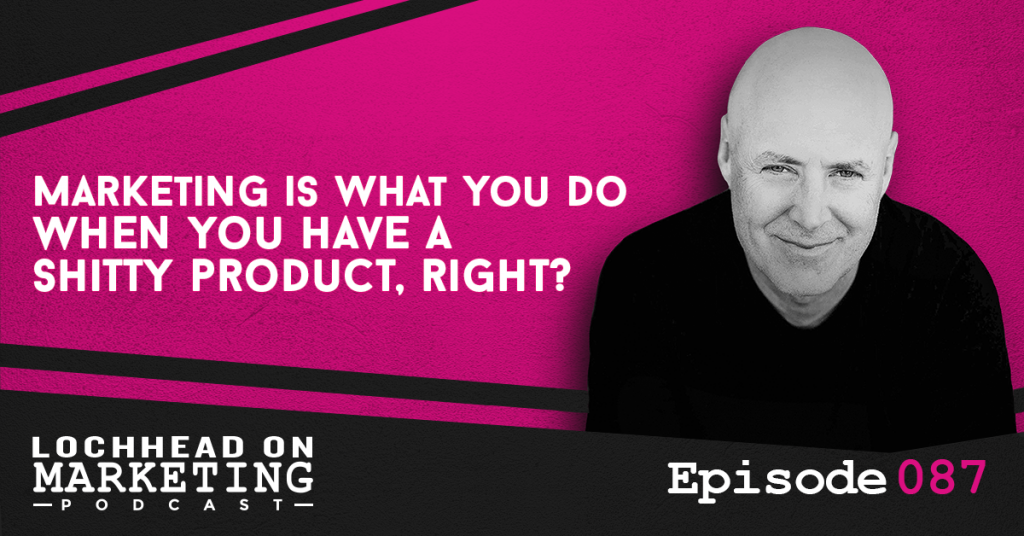
Podcast (lochheadonmarketing): Play in new window | Download (Duration: 11:08 — 5.1MB) | Embed
Subscribe: Apple Podcasts | Spotify | RSS | More
“Marketing is what you do when you have a shitty product.”
Says an ex-CEO/Software Engineer who found himself wrapping his company around the lamppost, with his entire executive team leaving, and his investors getting f*cked up. In spite of many stories like this, there are still a lot of people in Silicon Valley (and in the business world in general) who believe the best product wins and that marketing isn’t worth very much.
So in this episode, we dig into a research project involving one of the world’s greatest violin players and the Washington post. They prove that the power of category design and marketing is actually, almost everything
Everything Else is Bullsh*t
Most CEOs believe the best product wins. In fact, the CEO we previously mentioned also told Christopher “we make shit and we sell shit and everything else is bullshit.” Christopher narrates his personal experiences with various non-believers of the power of marketing and the importance of category design.
The Social Experiment
In 2007, legendary violinist Joshua Bell partnered with two time Pulitzer prize writer, Gean Weingarten of the Washington Post. The premise is Bell would play in Washington D.C. Metro Station and Weingarten would film and analyze what will happen.
This was an experiment about context, perception and priorities.
“Here’s what you need to know about Joshua Bell.. He has been called an internationally acclaimed virtuoso. Joshua regularly plays to massive sold-out crowds. Audiences hang on his every note. When he plays the violin, he tends to make a thousand dollars a minute.” – Christopher Lochhead
The Results of the Experiment
Bell played with his handcrafted $14 million violin. Weingarten wanted to know if people will be moved by the music of this master? If they were, how would they value the music that he was making? The results will shock you.
“The perception of your product or service is your product or service. Joshua plays and get paid a thousand dollars a minute because they’ve been told that he’s legendary. When people aren’t told that he’s legendary, hardly anybody gives a shit. So as marketers and category designers, we must never forget. We are in the perception, manufacturing business.” – Christopher Lochhead
To know more if marketing is what you do when you have a shitty product, download and listen to this episode.
Bio:
Christopher Lochhead is a #1 Apple podcaster and #1 Amazon bestselling co-author of books: Niche Down and Play Bigger.
He has been an advisor to over 50 venture-backed startups; a former three-time Silicon Valley public company CMO and an entrepreneur.
Furthermore, he has been called “one of the best minds in marketing” by The Marketing Journal, a “Human Exclamation Point” by Fast Company, a “quasar” by NBA legend Bill Walton and “off-putting to some” by The Economist.
In addition, he served as a chief marketing officer of software juggernaut Mercury Interactive. Hewlett-Packard acquired the company in 2006, for $4.5 billion.
He also co-founded the marketing consulting firm LOCHHEAD; was the founding CMO of Internet consulting firm Scient, and served as head of marketing at the CRM software firm Vantive.
We hope you enjoyed this episode of Lochhead on Marketing™! Christopher loves hearing from his listeners. Feel free to email him, connect on Facebook, Twitter, Instagram, and subscribe on Apple Podcast! You may also subscribe to his newsletter, The Difference, for some amazing content.
086 Are You Wasting Your Career?
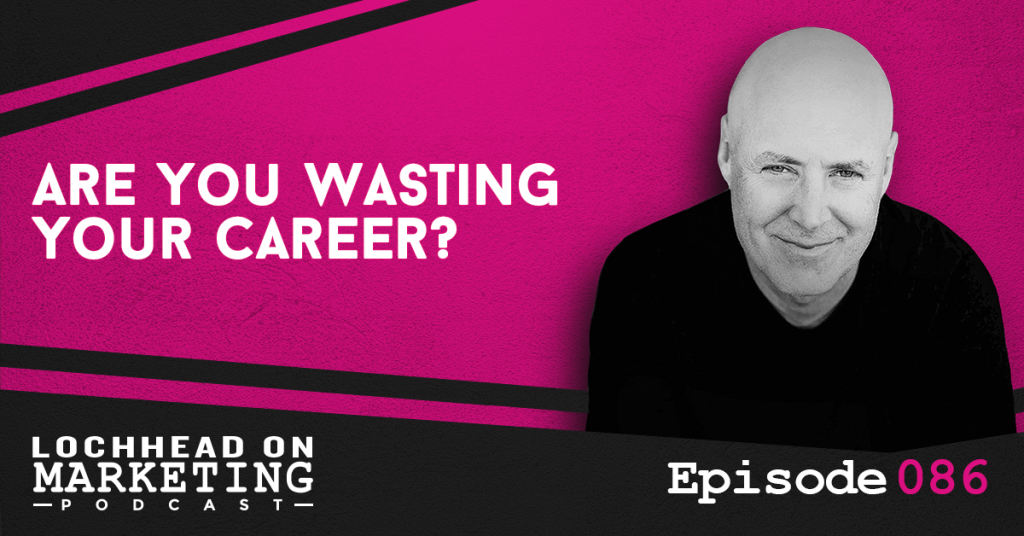
Podcast (lochheadonmarketing): Play in new window | Download (Duration: 14:51 — 10.2MB) | Embed
Subscribe: Apple Podcasts | Spotify | RSS | More
According to the January 2018 report from the Bureau of Labor Statistics, the average person changes jobs 10 to 15 times within their career. If you take it from that perspective, if you’re 25 years old and you are serious in your career, you still get seven chances to do something legendary in your career before you hit the big 6-0.
So in today’s episode, we ask, are you wasting your career?
Make Every Career Count
You get a very few chances to do something legendary, so make them count. Mike Maples of podcast Starting Greatness says “start or join a company worthy of your talent.” Christopher adds that a lot of people make the mistake of trying to sell themselves to a company, instead of you evaluating the potential of a company.
“Most people look at this backwards. They look at things like the salary, title, who their boss is going to be, the health care plan, vacation time, the commute. I’m not saying all those things aren’t important. They are important. I would start or suggest you start to look, ‘is this company. designing and dominating a giant space?’” – Christopher Lochhead
Work For Category Queens
Choose the best and the pioneers in their own space. That’s how you can make money out of your career. First, you get the job security and assurance that the company is here to stay. Secondly, most companies offer stock option for long term employees, which enables you to build wealth.
“You have to ask yourself, is this company, the leadership, the founder, the CEO, the CMO, the head of sales, the head of engineering —do they have what it takes to design a legendary product company and category at the same time and become the category queen?” – Christopher Lochhead
Find Ways To Earn Horizontally
Wise people take a job where they are getting paid to work and they convert that cash into investments. Over time they build a real nest egg. Christopher believes that it is important to find a career that enables you to gain investment opportunities. These investments can later on earn passive income for you.
“Convert sweat for cash into an investment that sweats for you.” – Christopher Lochhead
To know more if you are wasting your career, download and listen to this episode.
Bio:
Christopher Lochhead is a #1 Apple podcaster and #1 Amazon bestselling co-author of books: Niche Down and Play Bigger.
He has been an advisor to over 50 venture-backed startups; a former three-time Silicon Valley public company CMO and an entrepreneur.
Furthermore, he has been called “one of the best minds in marketing” by The Marketing Journal, a “Human Exclamation Point” by Fast Company, a “quasar” by NBA legend Bill Walton and “off-putting to some” by The Economist.
In addition, he served as a chief marketing officer of software juggernaut Mercury Interactive. Hewlett-Packard acquired the company in 2006, for $4.5 billion.
He also co-founded the marketing consulting firm LOCHHEAD; was the founding CMO of Internet consulting firm Scient, and served as head of marketing at the CRM software firm Vantive.
We hope you enjoyed this episode of Lochhead on Marketing™! Christopher loves hearing from his listeners. Feel free to email him, connect on Facebook, Twitter, Instagram, and subscribe on Apple Podcast! You may also subscribe to his newsletter, The Difference, for some amazing content.
085 Justice Deposits: How NetFlix, Twitter & Costco Are Leading Conscious Capital & You Can Too
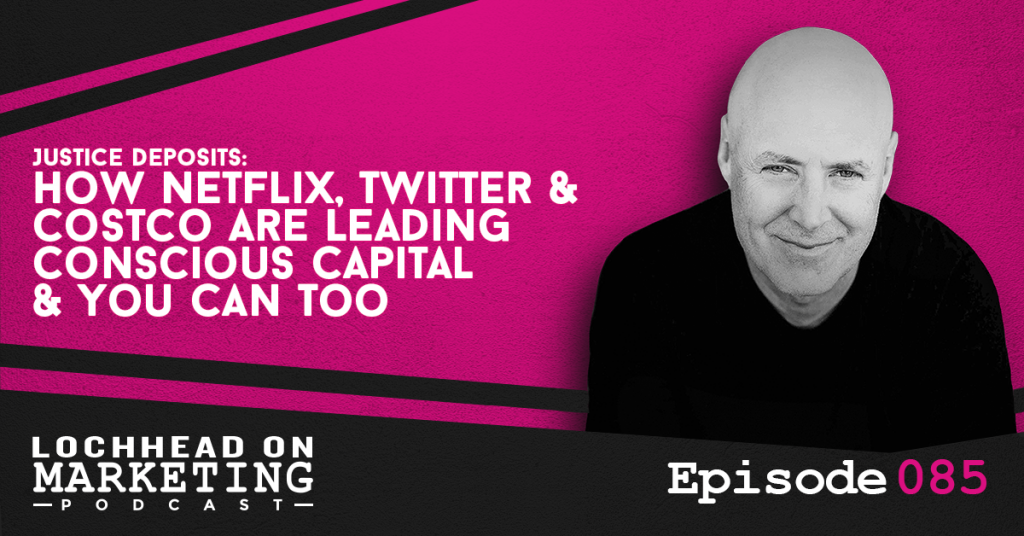
Podcast (lochheadonmarketing): Play in new window | Download (Duration: 17:50 — 12.2MB) | Embed
Subscribe: Apple Podcasts | Spotify | RSS | More
In June of 2020, Netflix announced that it was moving 2% of its cash equal to about $100 million to bolster black owned and black run banks, allowing these banks to lend more. The way this works is pretty simple: when we make deposits in a bank, that allows them to make more loans. More and more corporations and nonprofits are jumping in to join the movement.
In this episode, let’s go deep on the power of justice deposits.
Corporations Joining The Movement
After NetFlix’s announcement, Twitter announced its plan to move 1% of its cash or 100 million to community development financial institutions. Costco has pledged to move $25 million in deposits, Biogen has pledged to move 10 million and PayPal announced plans to move 500 million.
“The early adopters in this movement—the justice deposits—have pledged to move nearly $800 million. That is nearly equal to 20% of the current total assets held today in black owned and black run banks.” – Christopher Lochhead
Address The Root Cause of Inequality
Justice deposits inject capital into banks to banks to allow more Black Americans and minorities to gain access to capital. Aside from this, Christopher discusses on this episode why this is a very savvy marketing move. In fact, according to Harvard Business Review, 60% of Americans say that brands should take steps to address the root cause of racial inequality. It turns out, 50% of Americans go further and say brands must actually educate the public about this matter.
“There can be no equality in America without equal access to capital.” – Christopher Lochhead
HBR Article About Justice Deposits
This episode is a companion of a recent article in Harvard Business Review: “Could Gen Z Consumer Behavior Make Capitalism More Ethical?” It’s a very eye-opening article that we encourage you to read as well. Christopher, together with Eddie Yoon, Pastor Dave Ferguson and Pastor Quentin M. Mumphery collaborated on this research piece.
“What I think this means for CEOs, CMOS and even CFOs, is we need to pay attention. The Next Generation really cares about this stuff. And it’s very clear to me, and I think it should be clear to all of us that every company today needs what you could call a conscious capital strategy.” – Christopher Lochhead
To know more about justice deposits, download and listen to this episode.
Bio:
Christopher Lochhead is a #1 Apple podcaster and #1 Amazon bestselling co-author of books: Niche Down and Play Bigger.
He has been an advisor to over 50 venture-backed startups; a former three-time Silicon Valley public company CMO and an entrepreneur.
Furthermore, he has been called “one of the best minds in marketing” by The Marketing Journal, a “Human Exclamation Point” by Fast Company, a “quasar” by NBA legend Bill Walton and “off-putting to some” by The Economist.
In addition, he served as a chief marketing officer of software juggernaut Mercury Interactive. Hewlett-Packard acquired the company in 2006, for $4.5 billion.
He also co-founded the marketing consulting firm LOCHHEAD; was the founding CMO of Internet consulting firm Scient, and served as head of marketing at the CRM software firm Vantive.
Links:
Netflix Moves $100 Million in Deposits to Bolster Black Banks
Twitter will invest $100 million in lenders promoting racial equality
Consumers Want Brands to Take a Moral Stand on Racial Justice
Could Gen Z Consumer Behavior Make Capitalism More Ethical?
We hope you enjoyed this episode of Lochhead on Marketing™! Christopher loves hearing from his listeners. Feel free to email him, connect on Facebook, Twitter, Instagram, and subscribe on Apple Podcast! You may also subscribe to his newsletter, The Difference, for some amazing content.
084 Creating a Category? Do NOT listen to customers
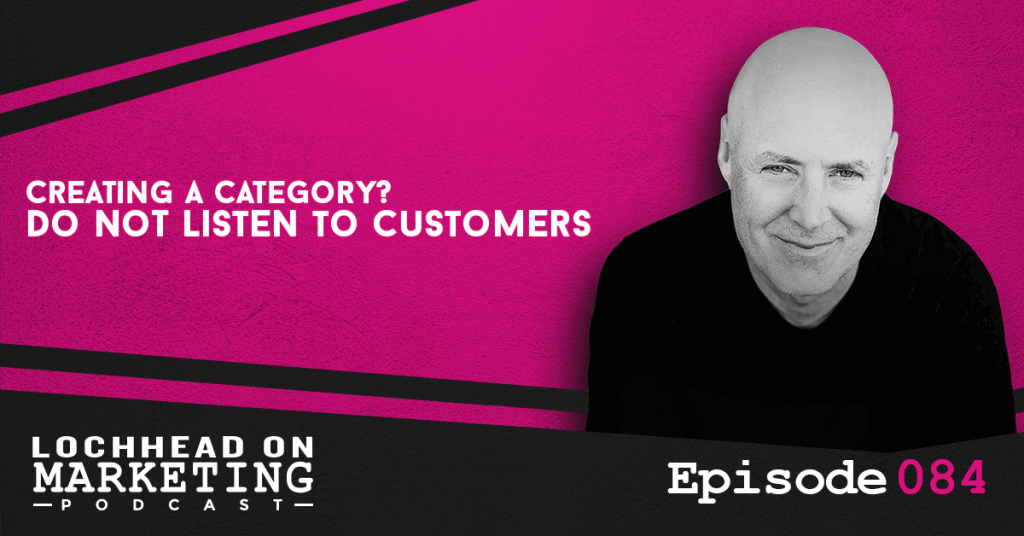
Podcast (lochheadonmarketing): Play in new window | Download (Duration: 5:23 — 3.7MB) | Embed
Subscribe: Apple Podcasts | Spotify | RSS | More
In this episode, let’s talk about why, when you’re designing a new category, you need to be very careful who you listen to. Often times, listening to customers is the worst thing you can do.
Whose Feedback Matters?
Christopher shares one of the things that they discussed in their book Play Bigger, that new categories are often only obvious in hindsight. He further advises that if you’re designing a new category, it’s critical to be very, very careful whose feedback you listen to.
“You don’t never forget. Nobody wanted a horseless carriage, never forget.” – Christopher Lochhead
Breakthrough in Hindsight
We should not listen to customers and most people, when we’re designing a breakthrough because most people can’t see it. Now, when you’re doing incremental things, customer feedback is awesome. But in general, most people cannot see a breakthrough, whether they’re customers, partners, potential employees, or even potential investors.
“You want to talk about your new category in the early stages with people who can engage in what you might think the art of the possible with you.” – Christopher Lochhead
To know more why you should not listen to customers when creating a legendary category, download and listen to this episode.
Bio:
Christopher Lochhead is a #1 Apple podcaster and #1 Amazon bestselling co-author of books: Niche Down and Play Bigger.
He has been an advisor to over 50 venture-backed startups; a former three-time Silicon Valley public company CMO and an entrepreneur.
Furthermore, he has been called “one of the best minds in marketing” by The Marketing Journal, a “Human Exclamation Point” by Fast Company, a “quasar” by NBA legend Bill Walton and “off-putting to some” by The Economist.
In addition, he served as a chief marketing officer of software juggernaut Mercury Interactive.
Hewlett-Packard acquired the company in 2006, for $4.5 billion. He also co-founded the marketing consulting firm LOCHHEAD; was the founding CMO of Internet consulting firm Scient, and served as head of marketing at the CRM software firm Vantive.
We hope you enjoyed this episode of Lochhead on Marketing™! Christopher loves hearing from his listeners. Feel free to email him, connect on Facebook, Twitter, Instagram, and subscribe on Apple Podcast! You may also subscribe to his newsletter, The Difference, for some amazing content.
083 The Problem With Your Marketing Plan
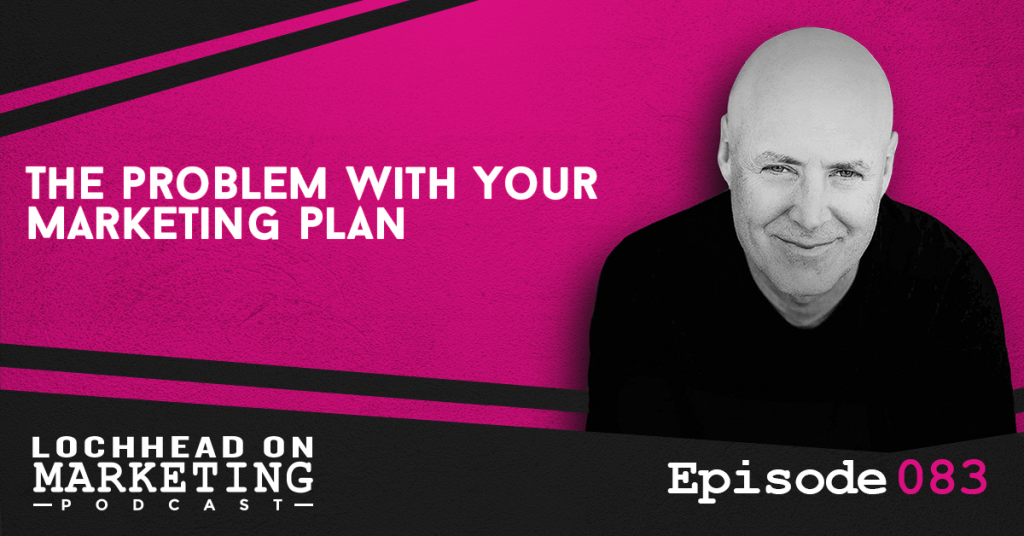
Podcast (lochheadonmarketing): Play in new window | Download (Duration: 13:55 — 9.6MB) | Embed
Subscribe: Apple Podcasts | Spotify | RSS | More
On this episode, let’s talk about what the problem with your marketing plan might be in specifically three areas. Number one, calling it a “plan” might be a problem. Number two, it’s actually a legendary marketing plan that is about more than just marketing. Lastly, number three, your relationship with your CFO and finance team might be a problem, but I’m hoping it won’t be when we’re done.Create A Marketing Framework
Chris describes what a “plan” entails and how an actual marketing plan should be fluid and should be consistently open for changes and adjustments. He suggests calling it more of a “framework” than a plan. Lastly, he gave some important valuable points on which marketing activities to invest on.“So as you start thinking about planning and budgeting, put things into big buckets, but assume change. That’s why calling it a framework might be a more powerful thing.” – Christopher Lochhead
Involving Everyone On The Team
A marketing plan (or framework) is more than just marketing. Chris describes how you should have a valuable relationship with the Head of Product or Engineering and Finance in plotting your plans for the company.“Drive a highly cross functional process with the team, interacting with marketing, sales, finance, customer support, and potentially other organizations to gather their input.” – Christopher Lochhead
Develop a Relationship With The CFO
Collaboration with other executives within your firm is very important in executing your marketing framework. Chris shares first hand experience as a CMO and how he developed a relationship with their CFO. He has some significant tips on how to adjust marketing investments that ultimately benefit Finance.“If you work well with your CFO, marketing can be a place to park cash.” – Christopher LochheadTo know more about the problem with your marketing plan, download and listen to this episode.
Bio:
Christopher Lochhead is a #1 Apple podcaster and #1 Amazon bestselling co-author of books: Niche Down and Play Bigger.
He has been an advisor to over 50 venture-backed startups; a former three-time Silicon Valley public company CMO and an entrepreneur. Furthermore, he has been called “one of the best minds in marketing” by The Marketing Journal, a “Human Exclamation Point” by Fast Company, a “quasar” by NBA legend Bill Walton and “off-putting to some” by The Economist. In addition, he served as a chief marketing officer of software juggernaut Mercury Interactive. Hewlett-Packard acquired the company in 2006, for $4.5 billion. He also co-founded the marketing consulting firm LOCHHEAD; was the founding CMO of Internet consulting firm Scient, and served as head of marketing at the CRM software firm Vantive. We hope you enjoyed this episode of Lochhead on Marketing™! Christopher loves hearing from his listeners. Feel free to email him, connect on Facebook, Twitter, Instagram, and subscribe on Apple Podcast! You may also subscribe to his newsletter, The Difference, for some amazing content.082 How Category Designers Do Acquisitions: Why Salesforce/Slack Is a Savvy Deal
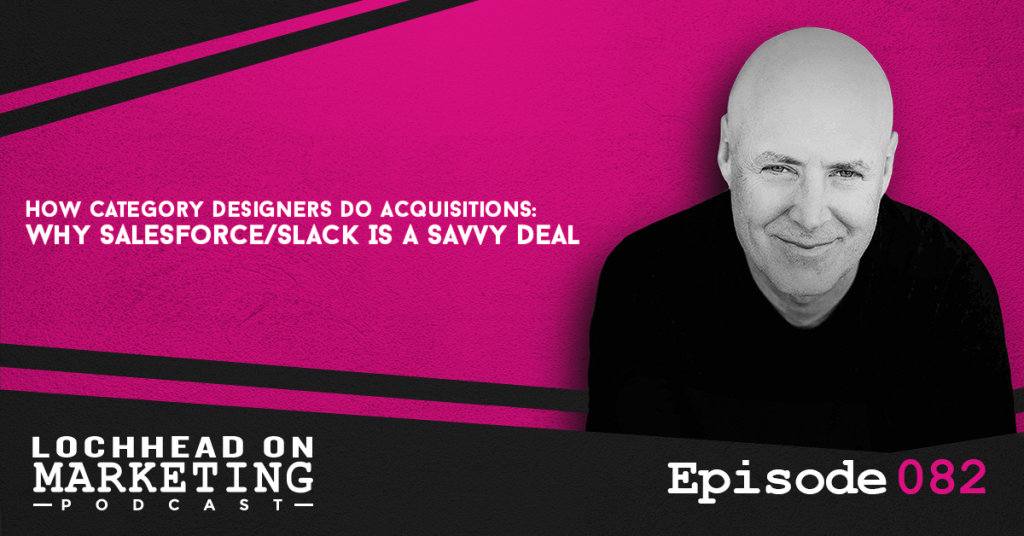
Podcast (lochheadonmarketing): Play in new window | Download (Duration: 13:44 — 9.4MB) | Embed
Subscribe: Apple Podcasts | Spotify | RSS | More
Most people look at acquisitions through a spreadsheet lens. Of course the financials matter for mergers and acquisition deals, but when viewed through a category design lens, acquisitions look very, very different. In this episode, we break down the differences using the Salesforce / Slack Deal as an example and Google purchasing YouTube way back 2006.
Two Types of M&A Deals
First one is category consolidation deals, which is usually done in market categories that are slow or have no growth. The second type of M&A deals are category acceleration deals, which happens in early or high growth market categories.
In line with this, let’s step back in memory lane, October of 2006, when Google purchased YouTube For $1.65B. YouTube was two years old then with just 65 employees. Many experts said predictable things like “how can Google be so stupid” “they paid so much for a company with little revenue, no profits.”
“In 2006, google didn’t buy YouTube’s technology, customers, or revenue or profits. Google was the category queen in Search and they bought the category queen in Video. They bought the #1 position in category. A category with massive potential. Potential, that some others could not see.” – Christopher Lochhead
Youtube: #2 Search Engine In The World
Legendary new categories are often obvious to most people, in hindsight. To put a fine point on this one: in 2019 YouTube did $15B in Ad sales. Google made a category acceleration deal. They redesigned part of the category landscape on the internet and they’ve been benefiting as a result ever since then
“Think of what could have happened to Google if Microsoft, Yahoo, Disney or someone else owned Youtube? As Internet categories were getting designed and redesigned, without YouTube, Google could have found its ass on the floor in the game of category musical chairs.” – Christopher Lochhead
Salesforce $28 billion Deal To Buy Slack
After Salesforce bought Slack for $28billion, their stock got hammered down to 11%. In fact, headline of MarketWatch.com is: Salesforce stock drops as Wall Street questions necessity of Slack purchase.
“Now there is an epic mega category battle going down for the new distributed, digital workplace. Here’s what they don’t get…Salesforce just increased their odd in this epic category battle.” – Christopher Lochhead
To know more about How Category Designers Do Acquisitions: Why Salesforce/Slack Is a Savvy Deal, download and listen to this episode.
Bio:
Christopher Lochhead is a #1 Apple podcaster and #1 Amazon bestselling co-author of books: Niche Down and Play Bigger.
He has been an advisor to over 50 venture-backed startups; a former three-time Silicon Valley public company CMO and an entrepreneur.
Furthermore, he has been called “one of the best minds in marketing” by The Marketing Journal, a “Human Exclamation Point” by Fast Company, a “quasar” by NBA legend Bill Walton and “off-putting to some” by The Economist.
In addition, he served as a chief marketing officer of software juggernaut Mercury Interactive. Hewlett-Packard acquired the company in 2006, for $4.5 billion.
He also co-founded the marketing consulting firm LOCHHEAD; was the founding CMO of Internet consulting firm Scient, and served as head of marketing at the CRM software firm Vantive.
Links:
Salesforce acquires Slack for over $27 billion, marking cloud software vendor’s largest deal ever
Salesforce to Acquire Slack for $27.7 Billion
Google to buy YouTube for $1.65 billion in stock
A Decade Ago, Google Bought YouTube — and It Was the Best Tech Deal Ever
Google buys YouTube for $1.65 billion
We hope you enjoyed this episode of Lochhead on Marketing™! Christopher loves hearing from his listeners. Feel free to email him, connect on Facebook, Twitter, Instagram, and subscribe on Apple Podcast! You may also subscribe to his newsletter, The Difference, for some amazing content.
081 Marketing Fail: Sherwin-Williams Vs. Ocean Spray
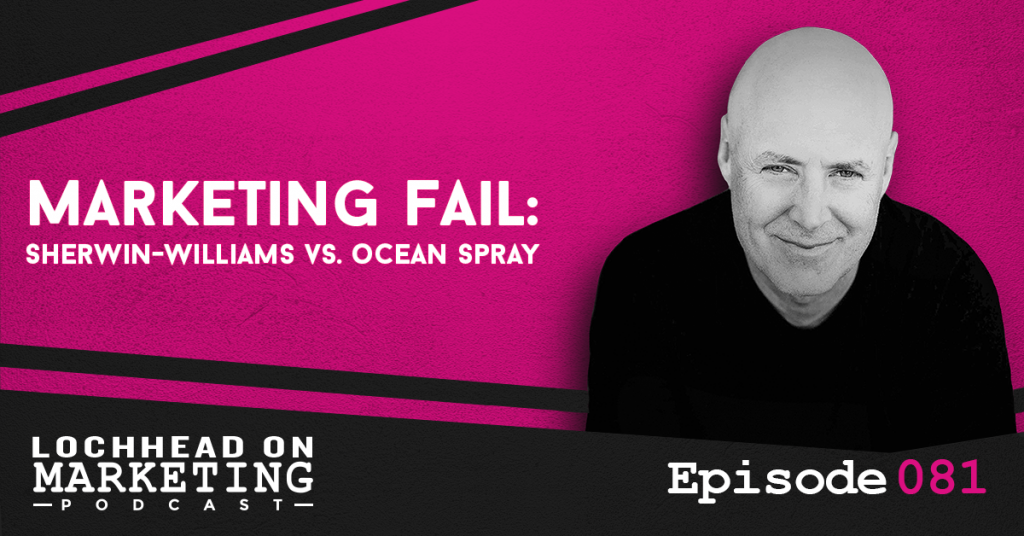
Podcast (lochheadonmarketing): Play in new window | Download (Duration: 9:29 — 6.5MB) | Embed
Subscribe: Apple Podcasts | Spotify | RSS | More
In today’s episode, we dig into two how two companies approached a viral situation. First, Ocean Spray’s positive trendjack in response to Nathan Apodaca’s viral TikTok video. Second, is how Sherwin-Williams fired an employee who created viral Tiktok videos mixing paints. We ask the seminal question, how can you be more like Ocean Spray?
Marketing Wins and Fails
When Nathan Apodaca’s Tik Tok video went viral (he was skateboarding, drinking his Ocean Spray, singing Fleetwood Mac’s “Dreams”), newly appointed Ocean Spray CEO, Tom Hayes took action. It was the trendjack of the year and Tom Hayes took it to a whole new level. It ultimately gave Ocean Spray positive PR.
Now, on the other hand, when Tony Piloseno, an Ohio University senior, who worked part-time at Sherwin Williams created a set of popular paint videos on TikTok, he got fired. What’s worse: Piloseno said he actually pitched Sherwin Williams Corporate Marketing Team the idea of being more active on TikTok with some of his videos.
“Piloseno says it took TWO MONTHS to get in touch with corporate marketing and they ‘basically told me that there wasn’t really any promotions going onso there wasn’t a need to see the presentation.’ %$#@!!!!” – Christopher Lochhead
What Savvy CEOs and CMOs Do
Do you work for a company like Ocean Spray or Sherwin Williams? If you want to be more like Ocean Spray, how do we do that? Most companies today, if they are smart, they have social media marketing departments trying to create what this guy has created.
“Savvy CEOs and CMOs invest heavily in creating legendary digital content. leaders want to share knowledge, they have a point of view, and as a result, they are mobilizing communities, they are creating movements and ultimately, they are growing their category and brands through a thought leadership owned media and earned media strategy.” – Christopher Lochhead
Seminal Questions To Ask
Christopher narrates one of his conversations with Robert Rosenberg, the former CEO of Dunkin Donuts. He and his team capitalized on one franchisee discovering a potential product, the munchkins and that is a great example providing support to your team.
“This brings us three seminal questions for all of us Marketers, number 1, are you building an Ocean Spray or Sherwin Williams-like culture? Number 2, are you encouraging radical creativity amongst your people and number? Number 3, are you building a digital owned media strategy and capability?” – Christopher Lochhead
To know more about marketing fail: Sherwin-Williams Vs. Ocean Spray story, download and listen to this episode.
Bio:
Christopher Lochhead is a #1 Apple podcaster and #1 Amazon bestselling co-author of books: Niche Down and Play Bigger.
He has been an advisor to over 50 venture-backed startups; a former three-time Silicon Valley public company CMO and an entrepreneur.
Furthermore, he has been called “one of the best minds in marketing” by The Marketing Journal, a “Human Exclamation Point” by Fast Company, a “quasar” by NBA legend Bill Walton and “off-putting to some” by The Economist.
In addition, he served as a chief marketing officer of software juggernaut Mercury Interactive. Hewlett-Packard acquired the company in 2006, for $4.5 billion.
He also co-founded the marketing consulting firm LOCHHEAD; was the founding CMO of Internet consulting firm Scient, and served as head of marketing at the CRM software firm Vantive.
We hope you enjoyed this episode of Lochhead on Marketing™! Christopher loves hearing from his listeners. Feel free to email him, connect on Facebook, Twitter, Instagram, and subscribe on Apple Podcast! You may also subscribe to his newsletter, The Difference, for some amazing content.
080 3 Ideas To Have A Legendary Marketing Career to 50 and Beyond
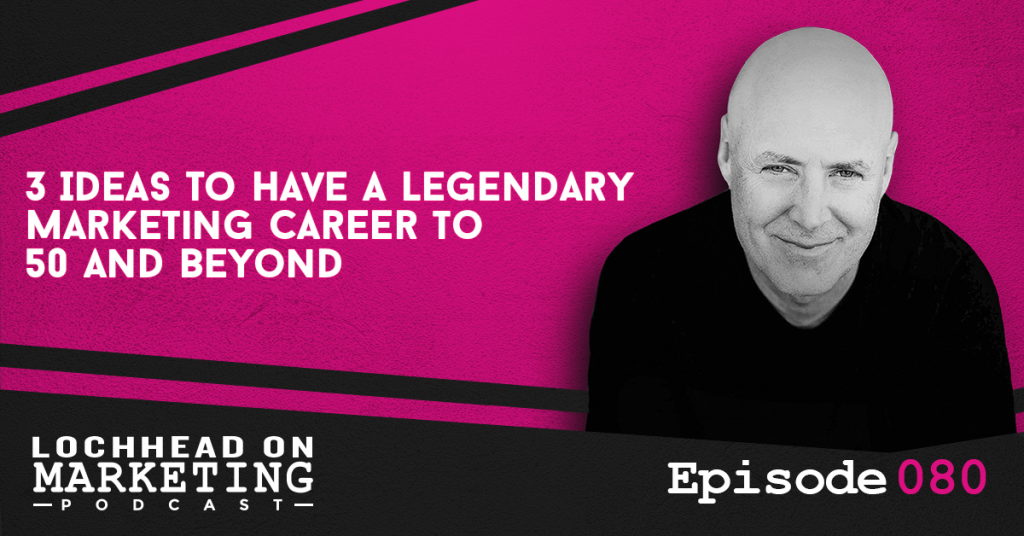
Podcast (lochheadonmarketing): Play in new window | Download (Duration: 13:32 — 9.3MB) | Embed
Subscribe: Apple Podcasts | Spotify | RSS | More
At a time when career uncertainty is high and the need for economic security has maybe never been higher, let’s talk about three ideas on how you can have a legendary marketing career to 50 and beyond. If you’re younger or older than 50, Chris has got some ideas for you in this episode.
Ageism In Business
During the last episode with Dave Gerhardt, CEO of Privy, there was a question that popped up around the possibility of having a career in marketing past the age 50. Chris thinks there’s ageism in business broadly and certainly, in the tech business as well. He further shares facts from an Harvard Business Review that says, “seven out of 18 top Silicon Valley companies having a median age of 30 or younger.”
“In addition, a study conducted by the San Francisco federal reserve bank showed that callback rates for jobs for older people, older applicants were much less. And with women having lower callback rates than men, additionally, more research from Stanford. The Stanford center on longevity says that, contrary to popular belief, older workers are healthy and have a strong work ethic and tend to be very loyal to their employers and are more likely to be satisfied with their jobs than their younger coworkers.” – Christopher Lochhead
If You Are Over 50
Some may claim that younger professionals have more energy to fulfill work. However, London Business School published a study which showed that people under 45 were exhausted. So now, Chris advises listeners, ages 50 and above, to become known for a niche that you own.
“You don’t want to be just a generic marketing person. What you want to be is recognized as an expert, as a guru, as a Yoda, as a sensei in a particular type or style or approach or discipline of marketing said in a simple way, niche down.” – Christopher Lochhead
3 Ideas For Your Career
Number one, ask yourself the Seminole question, “what am I great at that few others are great at, that also delivers the most economic value.” Step two, niche down hard on that superpower skill. Third, name yourself in your niche, claim it and frame it.
“Now you know that your personal niche is working for you. You become known for a niche that you own. As that happens, as you age and, assuming you stay current, you do legendary work. You have to produce legendary results. There’s no question about it. Of course, you have to build great relationships. So you do those other smart things along with being known for a niche that you own.” – Christopher Lochhead
To know more about the 3 Ideas To Have A Legendary Marketing Career to 50 and Beyond, download and listen to this episode.
Bio:
Christopher Lochhead is a #1 Apple podcaster and #1 Amazon bestselling co-author of books: Niche Down and Play Bigger.
He has been an advisor to over 50 venture-backed startups; a former three-time Silicon Valley public company CMO and an entrepreneur.
Furthermore, he has been called “one of the best minds in marketing” by The Marketing Journal, a “Human Exclamation Point” by Fast Company, a “quasar” by NBA legend Bill Walton and “off-putting to some” by The Economist.
In addition, he served as a chief marketing officer of software juggernaut Mercury Interactive. Hewlett-Packard acquired the company in 2006, for $4.5 billion.
He also co-founded the marketing consulting firm LOCHHEAD; was the founding CMO of Internet consulting firm Scient, and served as head of marketing at the CRM software firm Vantive.
Links:
5 Ways to Respond to Ageism in a Job Interview
Silicon Valley has an age problem
Study using fake resumes shows widespread age discrimination
Our Assumptions About Old and Young Workers Are Wrong
We hope you enjoyed this episode of Lochhead on Marketing™! Christopher loves hearing from his listeners. Feel free to email him, connect on Facebook, Twitter, Instagram, and subscribe on Apple Podcast! You may also subscribe to his newsletter, The Difference, for some amazing content.
079 How To Be A Legendary CMO w/ Dave Gerhardt
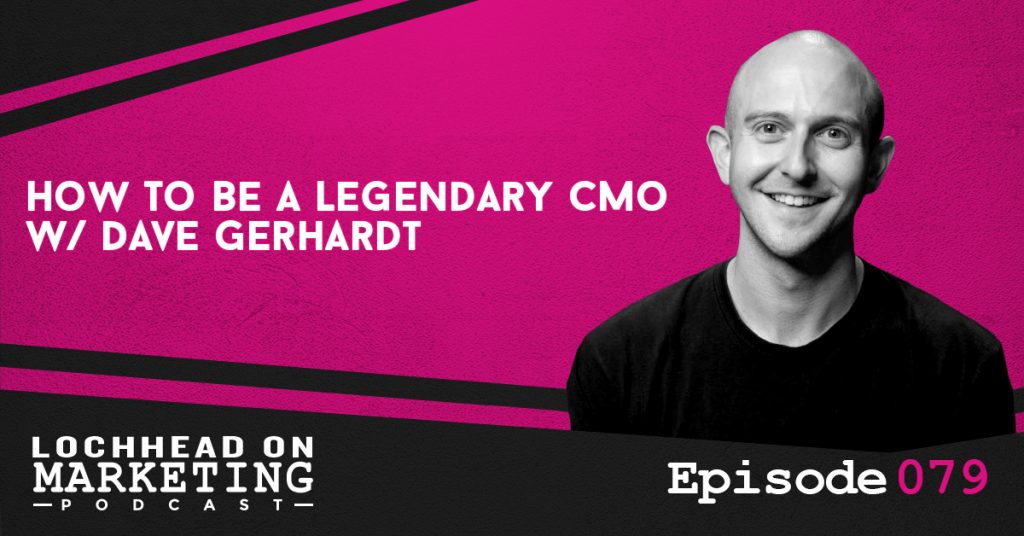
Podcast (lochheadonmarketing): Play in new window | Download (Duration: 1:12:13 — 49.6MB) | Embed
Subscribe: Apple Podcasts | Spotify | RSS | More
In this episode, one of the most high profile CMOs in the tech world, Dave Gearhart, aka DG, CMO of Privy is here. We have a fantastic conversation from marketing, planning to category, design, and more. Christopher recently guested on his podcast, which is called B2B Marketing Leaders. In a lot of ways, this conversation is a continuation of that conversation. It’s one younger CMO with one older CMO, we’ll let you decide who’s who. He’s also got an awesome new marketing group on Facebook called Digi MG. To know more about how to be a legendary CMO, download and listen to this episode.
